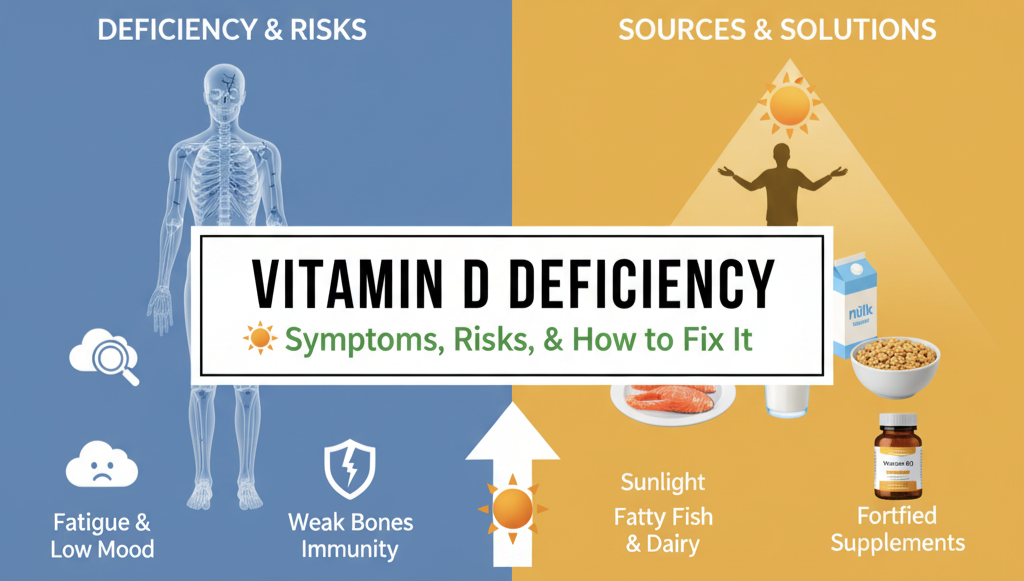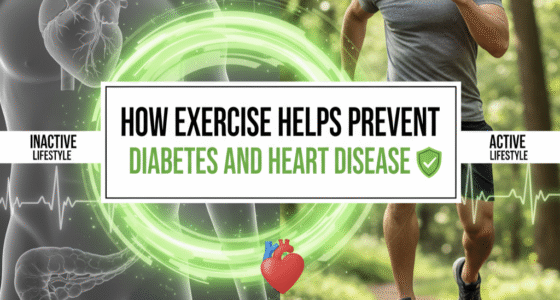Why Vitamin D is Important
Vitamin D plays a vital role in several bodily functions, including:
- Bone Health: It helps the body absorb calcium, which is crucial for strong bones and teeth.
- Immune System: Supports the immune system to fight off infections and diseases.
- Mood Regulation: Low vitamin D levels have been linked to depression and seasonal affective disorder (SAD).
- Heart Health: May help regulate blood pressure and reduce cardiovascular risks.
- Muscle Strength: Prevents muscle weakness and helps with physical performance.
Common Symptoms of Vitamin D Deficiency
Vitamin D deficiency can be silent, but some common signs include:
- Persistent fatigue or low energy
- Bone pain or frequent fractures
- Weakened immune system and frequent colds
- Hair loss and thinning
- Muscle weakness or cramps
- Depression, anxiety, or mood swings
- Slow wound healing
If you notice several of these symptoms, it’s a good idea to get your vitamin D levels checked by a healthcare provider.
Health Risks of Vitamin D Deficiency
Long-term vitamin D deficiency can lead to serious health problems, such as:
- Osteoporosis: Weak and brittle bones prone to fractures.
- Rickets: In children, deficiency may cause bone deformities.
- Heart Disease: Low vitamin D is linked to higher cardiovascular risks.
- Type 2 Diabetes: Deficiency may affect insulin sensitivity.
- Immune Disorders: Increased risk of autoimmune conditions.
- Cognitive Decline: May contribute to dementia and Alzheimer’s disease in older adults.
Causes of Vitamin D Deficiency
Several factors can lead to low vitamin D levels:
- Limited sun exposure due to indoor lifestyles or sunscreen use
- Living in northern regions with less sunlight
- Darker skin tones (melanin reduces vitamin D production)
- Age (older adults produce less vitamin D)
- Poor diet lacking vitamin D-rich foods
- Medical conditions that affect absorption (celiac disease, Crohn’s disease, kidney disease)
How to Fix Vitamin D Deficiency
The good news is that vitamin D deficiency can be corrected through lifestyle changes and, if necessary, supplementation. Here are proven ways to increase your vitamin D levels:
- Get More Sunlight: Aim for 10–30 minutes of direct sun exposure on your skin several times per week.
- Eat Vitamin D-Rich Foods: Fatty fish (salmon, mackerel, tuna), egg yolks, mushrooms, and fortified foods (milk, cereals).
- Take Vitamin D Supplements: Vitamin D3 (cholecalciferol) is more effective than D2. Dosage should be based on blood test results and doctor’s advice.
- Maintain a Healthy Weight: Obesity can reduce vitamin D bioavailability in the body.
- Combine with Other Nutrients: Calcium, magnesium, and vitamin K2 work synergistically with vitamin D for optimal health.
Recommended Daily Intake
General guidelines for daily vitamin D intake (may vary depending on age, location, and health status):
- Adults: 600–800 IU per day
- Older adults (65+): 800–1000 IU per day
- Children: 400–600 IU per day
- Individuals with deficiency: Higher doses as prescribed by a doctor
When to See a Doctor
If you suspect vitamin D deficiency or experience chronic symptoms like fatigue, bone pain, or frequent infections, consult a healthcare provider. A simple blood test can measure your vitamin D levels and help determine if you need supplements.
Conclusion
Vitamin D deficiency is more common than most people realize, but it is also one of the easiest deficiencies to correct. By getting enough sunlight, eating vitamin D-rich foods, and supplementing when necessary, you can protect your bones, strengthen your immune system, and improve your overall well-being. Don’t ignore the warning signs—taking action today can help prevent serious health problems tomorrow.









